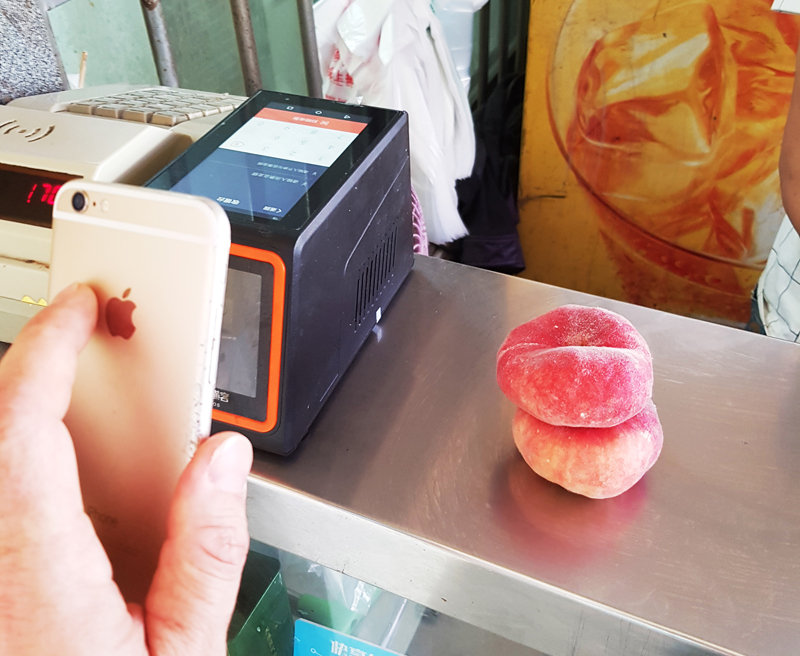Convenience vs privacy in Sino-French business development


To improve their citizens' quality of life, China and France are building on old and new business relationships that incorporate industrial competition with stable and economically beneficial exchanges.
As mobile commerce becomes a vital part of everyday life in both countries, improving cross-cultural understanding can maximise society and business.
Necessary mutual understanding
Both culturally rich and unique countries, there are ample opportunities for both China and France to tap into local platforms to enhance the traditional tourist experience.
The generation of consumers born in the late 1990s and early 2000s profile China's approach to payment facilities. Wang Hanbo, 19, is one example of how integrated to online shopping and payments young Chinese are: "At the supermarket, I scan the on-screen QR code to make a payment... Back home, my grandma...becomes curious about making full use of this new gadget…Later, I open JD (Ed: JD.com is a big e-commerce player in China) and select one of good quality. Via SF (Ed: SF is Chinese delivery services company), I will receive it in a few hours… These are just a few elements of phone conveniences."
I asked her, What does your mobile and WeChat pay represent in your everyday life?
She concludes, "I check lecture materials in class, chat with friends, take the subway with it, pay everything… To be honest, I have no idea how many times I use it every hour, every day!"
But to facilitate greater exchanges, Chinese, when in France, should adapt to the country's tradition of cash-based payments - and in business, developing a strong platform without such reliance on digital methods may be required.
Overview of WeChat, Alipay and Pinduoduo
WeChat and Alipay represent the two biggest payment platforms, Alipay covering 54 countries and regions, and WeChat available in 17 currencies in 49 countries and regions. These third-party payment facilities come from Chinese business giant Alibaba and tech giant Tencent. Both revolutionize the way Chinese people pay for…anything, offering transparency and convenience.
WeChat Pay is first and foremost a social media networking app that doubles as a user-friendly social payment system. Alipay is the best online payment method for retailers and wholesalers - and while the two compete in the Chinese market, they mean little to the French.
This could be the country's resentment for digital payments overall. The "Libra" currency from the Libra Association, co-founded by Facebook, is trying to push itself into a modern user-base with little appeal. Even if it's presented as a "global cryptocurrency" that is "digital, mobile, stable, fast, cheap and secure", cash and sometimes checks are still the main way to pay alongside bank card transactions.
On the contrary, few people use cash in China, as mobile payments are common practice, thanks to its convenience - the keyword of B2C (Business to Consumers) transactions - and with many services streamlined to preferably receive mobile payments.
Capitalising on the market, Pinduoduo is an emerging social commerce app with a group-buying feature that enables more discounts and recommendations. Users promote the platform by sending links or actively sharing products to friends, with the aim of bargaining prices. Users seek out special deals, and the app recommends products based on product popularity and users' purchase history.
It is also popular along lower-income populations. As its C2B (Consumer to Business) model sells in bulk, it eliminates intermediaries by directly connecting consumers and sellers, allowing cheaper prices. It is also IP sensitive, prioritising products based on users' location.
In France, Facebook is (still) not a norm
The main reason behind digital payment reservations in France is privacy concerns. Consumer protection in France prohibits any unfair or deceptive practice in commerce, as well as in e-commerce and mobile commerce. With privacy so highly valued, Facebook is one example of the ongoing digital struggle - since 2011, the brand has been accused of deceptive practices following discrepancies between what it says to consumers, and what it actually does. In August, the US Federal Trade Commission, imposed a record $5 billion fine on Facebook for personal data breaches, and it remains on the sidelines of social connectivity in France.
So even if social media may enhance our lives, it also raises concerns around the "information society", such as the use of data we share - a key concern for France's population. Social media may take or manipulate without our knowledge or consent, and we would be more vulnerable if our bank accounts were linked.
New E-Silk Roads from China to France?
Chinese consumers have evolved in line with e-commerce, driving and shaping the online market. Overall, Chinese platforms are beginning to strengthen globally. In several Southeast Asian countries, Chinese investments through infrastructure provide access to these markets and, at the same time, contribute to the growth of domestic markets.
For French small and medium businesses (SMBs), the risk in e-commerce is limited, providing a unique opportunity to gain access to new markets.
Social commerce, the next norm
For French companies, it is important to seek growth in new Chinese cities, with a particular focus on cities with several million inhabitants in third or fourth-tier cities where entry costs are lower and rental costs more affordable.
To seize market opportunities between France and China, introspection of the current Chinese mobile commerce phenomenon will provide the best insight. There is potential in branding, delivery and payment for many French companies to do well. Learning to combine the preservation of privacy and use of convenience models inspired by China will capture the best of Sino-French relationships, as well as the future business exchanges.
The author is professor of Mobile Commerce at ESCE International Business School, INSEEC U Research Center, Paris, France and visiting professor at UIBE, Beijing, China.
The opinions expressed here are those of the writer and do not represent the views of China Daily and China Daily website.


































